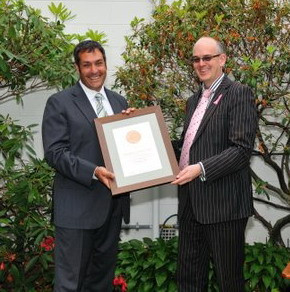The inaugural HRC Beaven Medal for excellence in translational research was presented to Dr Martin Than, a consultant specialist in Emergency Medicine at the Canterbury District Health Board, for research that will provide an innovative and workable change to the medical decision-making process for patients presenting acutely to Emergency Departments with chest pain that may be due to a heart attack.
The Minister of Health, Hon. Tony Ryall, presented Dr Than with the Beaven Medal at a function to celebrate the 50th anniversary of the Canterbury Medical Research Foundation in Christchurch on 2 December 2010. Minister Ryall said he was “delighted to present the inaugural Beaven medal to Dr Than in recognition of his innovative research project, which will make a significant contribution towards translational health research.”
The Beaven Medal, named after the late Professor Sir Donald Ward Beaven, KNZM, CBE (1924 – 2009), recognises Sir Don’s long time interest in translating research into clinical practice and will be awarded annually by the HRC.
“The HRC’s new Beaven Medal is a way of ensuring that Sir Don’s incredible life and association with diabetes and translational medical research is remembered,” Mr Ryall said.
“I am confident that Dr Than’s research project will contribute to a primary outcome of improved health service delivery over the short-to-medium term, at local, regional and national levels,” says HRC Chief Executive, Dr Robin Olds.
In a randomised trial, current care will be compared with a new ‘fast-track’ pathway.
Preliminary research suggests that an accelerated pathway with early blood tests in a targeted low-risk group of presenting patients, can be used to rule out the diagnosis of a heart attack approximately 10 hours earlier than with conventional diagnostic assessment. This would allow earlier progression to the next phase of chest pain investigations, prevent unnecessary hospital admissions and facilitate early discharge home. This outcome will be extremely beneficial for patients, who will be reassured earlier that a heart attack has been ruled out and avoid the inconvenience of hospital admission. It also has the potential to change clinical practice in a costeffective way, by reducing unnecessary admissions, duplication of staff activities and pressure upon urgent care services.
“Professor Sir Donald Beaven had a prestigious career, but it was his passion for medical education, medical research and diabetes that he will be most remembered for. His passion for learning will continue to be an inspiration for students and teachers across New Zealand and I hope that it will inspire many of our health researchers to follow in Sir Don’s footsteps,” said Mr Robert Stewart, Chair of the HRC Board.
